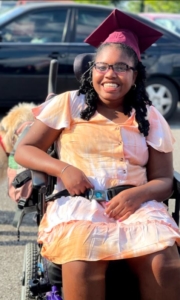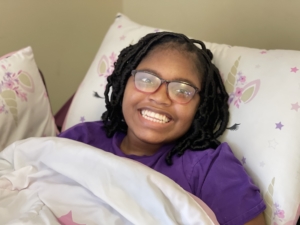Khari McCrary

Khari at 18
Moniqueca Barfield from Gardendale, Alabama, is the mother of 18-year-old Khari McCrary. In 2015, at just 12 years old, Khari McCrary experienced her first seizure and was misdiagnosed with generalized epilepsy. Receiving the correct diagnosis when Khari was 14 years old, initially was very challenging as Lafora disease is commonly confused with epilepsy.
Khari is the first Lafora case known in Alabama at this time. In January of 2017, Khari’s seizures worsened, and she started having multiple seizures a day. In June of 2017, she was referred to a specialist who recommended a weeklong stay at Children’s Hospital of Alabama where she endured a week of testing on the epilepsy monitoring unit. It was then that she was diagnosed with the lifelong rare genetic disease called Lafora.

Khari at 14
Lafora is a progressive, autosomal recessive neurodegenerative disorder characterized by intractable seizures, difficulty walking, muscle spasms, neurological deterioration, rapid cognitive decline, childhood dementia, and oftentimes death, typically within 10 years of onset.
Before Khari’s diagnosis, she had a normal teenage life. Like most teenagers, she was very active in sports. In the fourth grade, Khari tested as a gifted child with an IQ of 118. Now she has an IQ of less than 60. She went from being a straight “A”, independent student to having an escort to assist her to and from her classes.
Mother, Moniqueca Barfield states in her own words “Our world has been turned upside down. Khari depends on someone to be with her at all times which is very emotionally draining for a 15 year old.”

Khari McCrary
I’m a single mother, working, serving in the military, and caring for my two school-aged children. I’m still able to work but I have to take a lot of time off due to Khari’s seizures and medical appointments. I have to ensure someone is present at my home to get her off the bus until I arrive home from work, and be with her at all times (bathroom, showering, etc.). On top of this, Khari has a younger sister who requires my time and attention as well. The financial burden is significant. I’m thankful I have an understanding boss and good healthcare coverage but even so, the constant trips to the emergency room and having to take time off for frequent doctor visits really takes its toll. I hope a cure can be found soon and that no child will have to go through what we’ve gone through. I wouldn’t wish this on anyone. My family lives every minute unsure when or where a seizure may occur. When Khari initially begin having seizures, she researched service dogs for her condition. At that time, I didn’t entertain the thought because I knew it would be another responsibility. However, once Khari’s condition worsened, I decided to apply for seizure alert service dog. Once we were approved, we faced another challenge of raising $10,000 of the $20,000 for a service dog through Service Dogs Alabama. After realizing how challenging it would be to achieve the goal within a timely manner, I decided to let the world into my usually private life and asked the community for help through an interview with WBRC. Khari has since received a wheelchair from Children’s Rehabilitation Services, and is due to receive her service dog in May. Now I’m faced with another challenge of not having a vehicle to accommodate our family and its special needs.”
Moniqueca has been a wonderful advocate for her daughter helping her since symptoms started. She created awareness to help get Khari a service dog back in 2018 to assist with alerting the family of Khari’s seizures, read the story here
Also just recently an update with Khari and her service dog Tallulah in August 2021, read the story here

Khari in 2019



Leave a Reply
Want to join the discussion?Feel free to contribute!